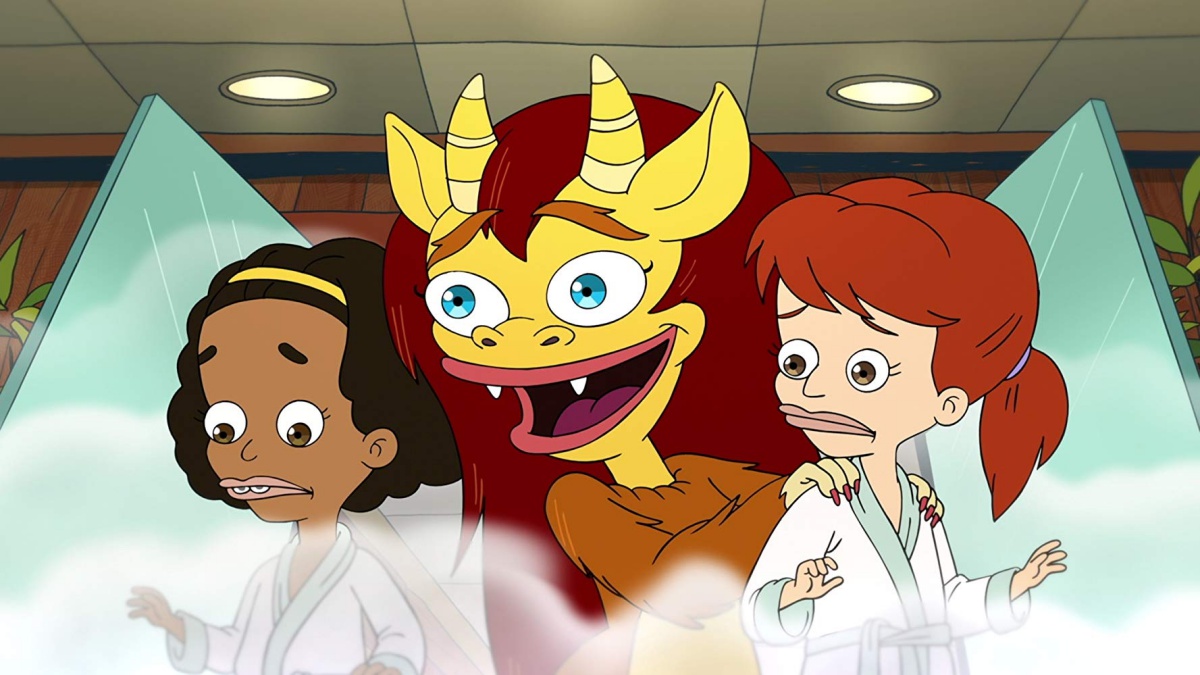Big Mouth Powerfully Examines Female Sexuality & Depression in Season Two

Netflix’s Big Mouth was a series I hadn’t expected to get so much out of when it first aired, yet it has managed to encompass so many anxieties about the changing body, at a time in your life where you just want to fit in, for both boy and girls. When I tuned into season two, I saw that not only was it upping the sexuality, but it was also giving more focus to the female characters and their emotions, while addressing the way boys can be hurtful.
Season two of Big Mouth introduces the Shame Wizard, voiced by David Thewlis, who lives to make teens feel ashamed about their existing insecurities, and he has a lot of material to work with across gender lines. For Jessi, Missy, and Gina (voiced by Jessi Klein, Jenny Slate, and Gina Rodriguez respectively), their anxieties revolve around their physical bodies and emotional health.
Gina’s character is a girl who suddenly develops boobs, and it turns all the boys around her into boob-crazed monsters, triggering massive body insecurities in Jessi and Missy. Missy’s mirror-self starts to appear, encouraging her to wear hoodies to cover up the fact that she’s so flat-chested, and disparaging her looks. Jessi, who is dealing with her parents’ impending divorce, starts slut-shaming Gina, saying that this new attention from boys has nothing to do with her personality or intelligence, just boobs, reducing Gina in the same ways the boys are.
Gina, who is the object of all this attention, didn’t ask to have a developed body and to be hyper-sexualized by everyone. In fact, throughout the season, Gina never wears anything that isn’t just normal teenage girl clothes. The only difference is the fact that she has breasts, and clothes will just look different on her because of that. As someone who was a busty teen, I found Gina’s storyline very relatable, because women of color are already “adultified,” and the fact that it caused such resentment from her female peers and dehumanization from dudes is a rough reality.
Big Mouth this season is really unafraid of calling out the male characters for their treatment of girls and it’s so important because, while the audience for Big Mouth is much older than the characters themselves, the messages are still important takeaways. In “Drug Buddies,” Andrew tries to break up with Lola, who is frankly the worst and abusive, but she is also open to making out with him and allowing him to rub up against her until he ejaculates.
Andrew does this because she’s just a warm body for him to please himself, but ignores the fact that Lola may be doing this because she wants him to like her. She’s the one who calls him her boyfriend. Andrew wants to be a “nice guy,” so he’s nicer and nicer to Lola, making her feel important before eventually dumping her.
In “Guy Town,” Andrew gets some bad advice from some scummy men, convincing him that “humping and dumping” is “pimp” until he says it out loud and realizes that what he did was deeply hurtful to Lola, because he knew that he didn’t like her, so he shouldn’t have made out and messed around with her just for his own gratification. I was proud of the show of recognizing that, rather than just dismissing Lola’s pain because she’s the worst.
Jessi, throughout the season, is engaging in typical acting out bad behavior, shoplifting things she doesn’t need, stealing from her mom’s purse, and doing drugs, all with Connie The Hormone Monstress guiding her most extreme behavior. It rises and rises until it reaches its plateau during “Dark Side of the Boob,” when Andrew tells Jessi and others that Gina let him touch her boob when they made out. Jessi then, in bitterness, passes that information along accidentally, and Gina ends up slut-shamed the entire night. For Jessi, as someone who used to be a feminist and a defender of women, this is not who she wants to be.
In the finale, Jessi ends up meeting the Depression Kitty, and it was so surreal to see so many of my own mental health issues on this show. When it comes to onscreen depictions of women and mental health, a lot of the time, they are inaccurate and exploitative. Movies about cutting and eating disorders often spend more time worrying about making the actress “look” the part than taking the time to explain the emotional weight that comes with it. Hearing Jessi say, “It feels weird to be in bed in the middle of the day” while being pressed back down by the anthropomorphized embodiment of depression, I felt that.
According to ADAA, “by mid-adolescence, girls are twice as likely to develop mood disorders as boys,” and as a result, it can lead to “irritability” and a “persistent sad, anxious or ’empty’ mood.” So it was great that Jessi was able to say that she wanted to see a therapist at the end of the season. So many young people stigmatize that for so long that they never get to deal with their mental health.
Big Mouth continues to impress me. I can’t remember the last time I watched a show that really took the time to talk about STDs without stigma and showed a variety of different birth control, and the way it showed Andrew’s mom having an abortion was emotionally poignant without making it seem like she regretted it. Who would have expected that a show with so many dicks would have so much heart? And so much bush appreciation?
(image: Netflix)
Want more stories like this? Become a subscriber and support the site!
—The Mary Sue has a strict comment policy that forbids, but is not limited to, personal insults toward anyone, hate speech, and trolling.—
Have a tip we should know? tips@themarysue.com